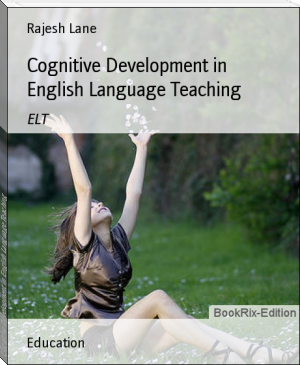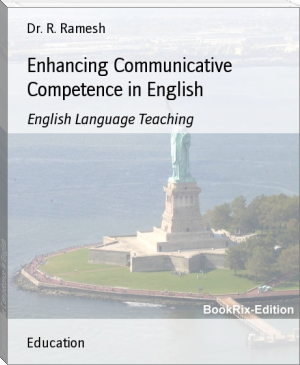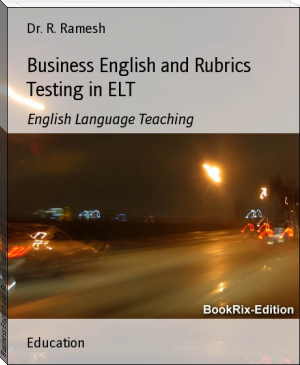Cognitive Development in English Language Teaching by Rajesh Lane (ereader android .txt) 📖

- Author: Rajesh Lane
Book online «Cognitive Development in English Language Teaching by Rajesh Lane (ereader android .txt) 📖». Author Rajesh Lane
( o ) Matching descriptions to pictures:
The picture of people which were cut out from magazines or news papers are circulated to students. The pictures should show more than just the face or head, that is, some indication of clothing would be useful. Teacher may asks for written description of one of these “ Wanted “ people, “ Police are looking for..“, “ Victims “, etc. Learners are asked to focus on the distinguishing features of the pictures, that is, the way they look, their dressing, hair style, facial expression, etc. on the pictures, Each students gives his / her own opinion on the picture.
( p ) Describing and drawing:
Teacher provides the students with a picture of an unfurnished flat or draws the same on the black board. Each learner is asked to furnish the flat, drawing the items of furniture and then to give a description of the flat; to arrange the furniture in the room. Students exchange descriptions with a partner. Learner draws the arrangement of furniture on another blank plan and furnishes it. Each learner may describe the same in different ways.
( q ) Telling a newscast:
A set of news paper headlines or items from the news in brief section of a paper or a set of news paper articles are presented to the learners to read out. Students are asked to analyze the events as they happened, background of the events, contrasting reported comments of observes and possible future developments. Students are asked to work in pairs or small groups. For a headline they have to write a short article, picking out key points of information and using them, to broadcast in class. Then learners are asked to read their article which they have written. Eventually they discuss the same with the peer group and teacher.
( r ) Performing a play:
The teacher motivates the learners to write a play. Learners are asked to discuss among their peer group. They write a play creatively or which they have already read, with their own dialogues. Students exchange the dialogues with their partners. They perform as a mother, child, father, police, judge, etc. The play is performed as real life situation.
( s ) Explaining reasons in cause and effect arguments:
In this task, members of peer group or the teacher creates the context by introducing general truth in and around the world. Students are asked to suggest causes / reasons and effects / results. The discussion may start like, why do women live longer than men?, why do the holes on ozone-layer appear?, etc. Students are asked to discuss in pairs and to decide which are the most important reasons, which are secondary, and which are not true or irrelevant. They may wish to add other reasons and suggestions. Eventually every learner explains the cause and effect in the classroom and it leads to general discussion.
( t ) Making advertisements:
In this task learners need to collect advertisements from news papers and magazines. Learners take an interesting advertisement and discuss it’s context and language with peer group. Learners are asked to write a requisition letter to the advertisement agents and exchange the same with his / her partner. Then learners himself produce advertisement and perform in class.
( u ) Presenting news items:
This task includes the Editorial page, Letters to the editor, Sports column, Globe scan, Science and Technology column, Business columns etc. The teacher gives advice to the learners on framing the editorial column, letters to the editor and the news items. Teacher explains how to begin, how to end, the direction to be used etc.
The teacher presents the context and learners are asked to write and read out in classroom. Then the learner himself creates the context on his / her own and writes it down and presents the same in classroom. The context may be ‘Universities and Scientific Research ‘, ‘Economic Growth and Decline ‘, ‘Harbhajan Back in Team’ etc..
( v ) Creating Poetry:
It is a kind of personal expression which the learner has to show. Teacher motivates the learners to write poems. Students are asked to think about the context; and the teacher encourages them to imagine and use feelings. Students choose their own context and write and then read the poem to the whole class.
Teacher circulates the context for learners as homework and they have to readout their homework in the classroom. Learners are free to choose contexts and write poems. They may choose the context as My mother, Trauma of an Iraqi, My love etc.
( w ) Interpreting Persuasive Speaking:
Teacher circulates the persuasive speech and writing of famous writers, presidents, politicians, artists, etc.. Teacher makes a brief discussion on persuasive speaking and writing with learners. Learners of peer group create the context and speaks. Teacher gives advice and lead then to speak persuasively. The context may be the president’s address and may start with “ Blood of my blood, Heart’s beat, Blossoming buds, etc.”
( x ) Interpreting graphs and diagrams:
Teacher explains the use of charts and graphs. Teacher presents some model of charts and the ways of presenting information. Learners produce charts and graphs of their own, for the context. The context may be population ratio, level of inflation, rainfall etc.. Learners are asked to explain the graph or chart to his / her partner.
( y ) Interpreting intelligence:
It includes verbal ability, verbal fluency, numerical ability, spatial ability, perceptual ability, inductive reasoning, memory, etc..
The teacher gives context and advice. Learners are asked to create context and to explain to other students the ways to solve the problem. Each learner creates a context and explains the problem solving techniques to his / her partner.
( z ) Presenting Welcome and Concluding Speech:
Learners are asked to give welcome speech and vote of thanks for the created context. Learners discuss with peer group and for their choice they select them to give welcome speech or vote of thanks. Before making welcome speech or vote of thanks, learners are asked to get the information about the chief guest,
 The desire to acquire knowledge about the surrounding world and human society is quite natural and understandable for a person. Life is so developed that an uneducated person will never occupy a high position in any field. Humanity in its mass, and each person individually, develops objectively, regardless of certain life circumstances and obstacles, but with different intensity. The speed of development depends on the quality of training.
The desire to acquire knowledge about the surrounding world and human society is quite natural and understandable for a person. Life is so developed that an uneducated person will never occupy a high position in any field. Humanity in its mass, and each person individually, develops objectively, regardless of certain life circumstances and obstacles, but with different intensity. The speed of development depends on the quality of training.




Comments (0)